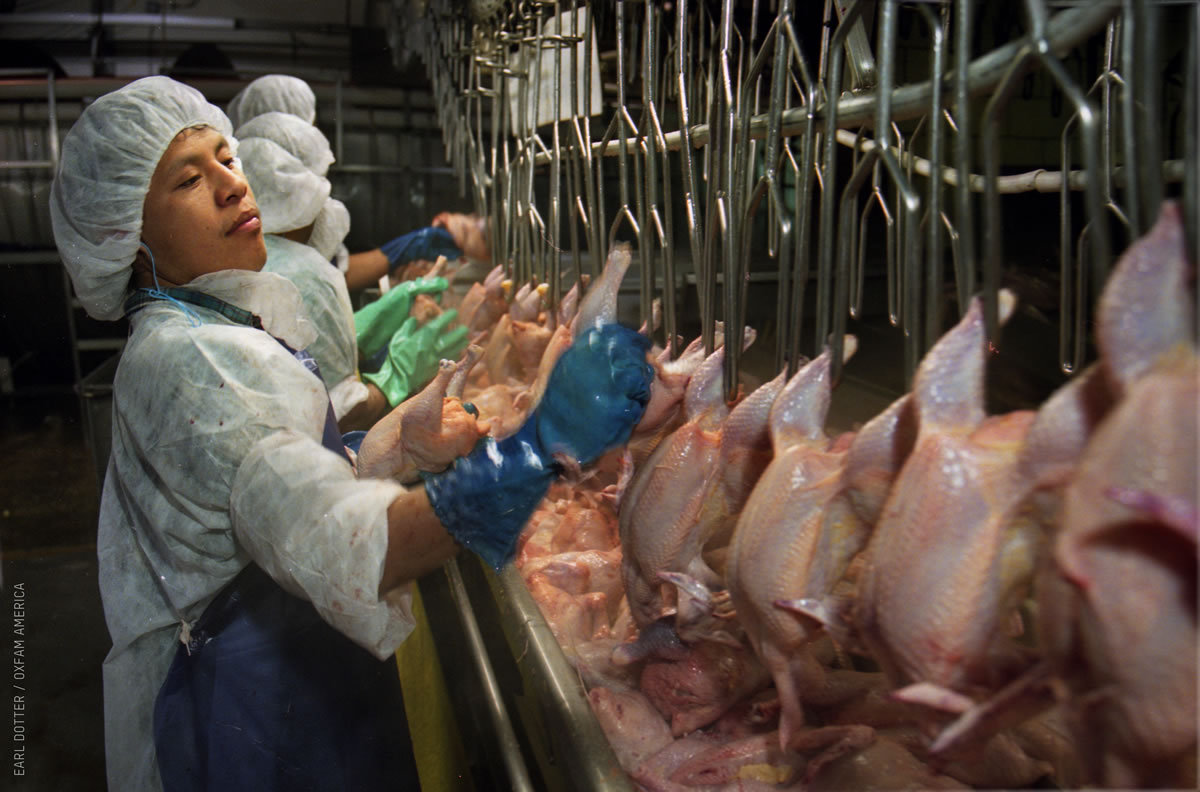With many food workers being forced to work as essential workers during COVID-19, workers are increasingly striking to draw attention to unsafe conditions. On Friday, workers at food plants in Virginia and Illinois walked off the jobs over dangerous conditions.
Friday’s wildcat strikes by food processing workers are part of a growing nationwide movement of food processing workers, who are walking off the job.
Earlier this week, 1,000 immigrant workers, members of UFCW Local 7, walked off the job in Colorado. Last week, non-union poultry workers in Georgia walked off the job to protest unsafe conditions.
This morning in Timberville, Virginia workers walked off the processing line at Pilgrim’s Pride poultry plant after one co-worker tested positive for COVID-19. 8 other workers have gone into quarantine after close contact with the worker.
Experts say that food processing plants are breeding grounds for COVID-19.
“Workers in poultry plants, where there may be over 1,000 workers a day, work very close together, sometimes shoulder to shoulder with knives and scissors, making thousands of cuts a day to produce the chicken pieces we buy in the supermarkets,” says former Obama-era OSHA Chief of Staff Debbie Berkowitz, who now serves as Worker Health and Safety Program Director at the National Employment Law Project.
“On a normal day, many never get to the bathroom, because there is little time to go when they are on the line and breaks are too short for all to use the bathroom. This makes these workplaces a real hot spot for the spread of COVID 19,” says Berkowitz
Workers at the Pilgrim’s Pride plant say that the company has left them in the dark about what is happening after a co-worker tested positive for COVID-19.
“They worked us all day, they didn’t tell us, and we didn’t know how long that they have known,” Pilgrim’s Pride Ann Polk told WHSV. “When we left, I guess we heard they quarantined eight people; we want to know who these people are. and if we came into contact with them.”
The workers are demanding that the company shut down the plant for two weeks to allow workers who may have been exposed to COVID-19 to self-quarantine.
They are also demanding that the company provide personal protective equipment for them. So far, workers say that the company has only increased the hand sanitizers available to workers on the meat processing lines at Pilgrim’s Pride.
With no federal regulations on workplace safety against COVID-19, workers say that the companies in so-called “essential services” are not doing enough to protect them.
As part of the most recent COVID-19 bailout package, the Democratic-controlled House of Representatives passed a measure that would have forced OSHA to use a temporary standard to places specific requirements on how companies are supposed to protect the frontline workers.
However, the GOP-controlled Senate and Trump Administration blocked the measure. Instead, OSHA has issued mere guidance, creating a chaotic situation putting more essential workers, particularly in food processing at risk.
“Without any required OSHA protections, and just suggested guidance, worker safety is left up to each company,” says Berkowitz
At the same time that Pilgrim’s Pride workers in Virginia were walking out, a group of mostly Latina workers, members of UFCW Local 881, making flan and gelatin went on strike at Raymundo Food in Chicago suburb of Bedford Park.
The walk-off occurred after one worker tested positive for COVID-19 at the facility.
Two other co-workers have also begun to show symptoms of COVID-19.
“We’re all at Raymundo’s because we need the work to support our families. But the health of our family comes before everything else. What the company offered–to clean Saturday and come back to work on Monday–is not sufficient,” says Julia Garcia.
Workers at Raymundo don’t have paid sick days, so many feel forced to go to work even when they are not feeling well. Indeed, many workers report that the company is no longer allowing the largely immigrant force to take even unpaid time off.
The 180 workers at Raymundo Foods recently unionized in November of. 2019.
However, so far the company has refused to agree to a policy with the union to protect workers in the age of COVID-19.
“We need paid time off to stay home for two weeks to make sure we are all safe and that no one else has the virus. We need to be sure the company has fully disinfected the plant so that in two weeks, we can all come back safe, and with more confidence of feeling protected on the job,” says Garcia.
With federal OSHA failing to act, worker advocates say that more workers are going to take action into their own hands.
Donate to Help Us Keep Covering How Labor is Fighting Back Against COVID-19

